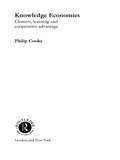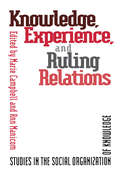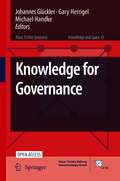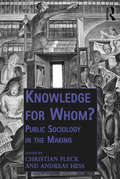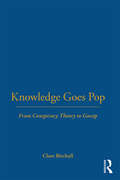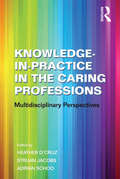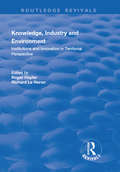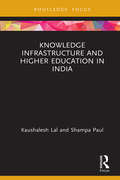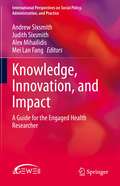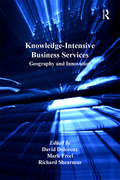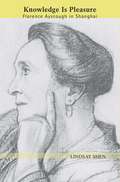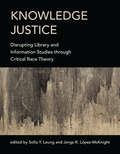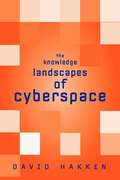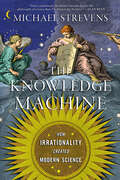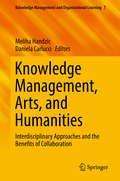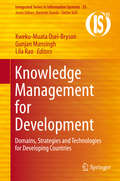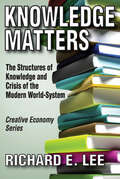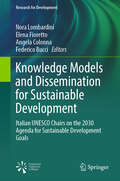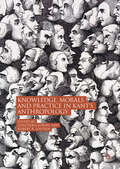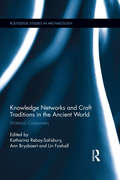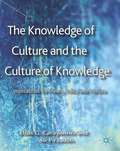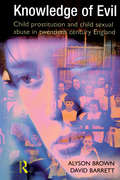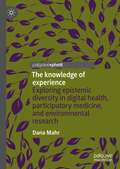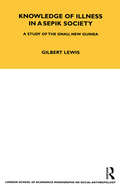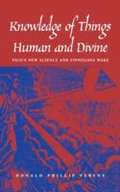- Table View
- List View
Knowledge Economies: Clusters, Learning and Cooperative Advantage (Routledge Studies in International Business and the World Economy #Vol. 26)
by Philip CookeThis book traces the theoretical explanation for clusters back to the work of classical economists and their more modern disciples, who saw economic development as a process involving serious imbalances in the exploitation of resources. Initially, natural resource endowments explained the formation of nineteenth and early twentieth-century industrial districts. Today, geographical concentrations of scientific and creative knowledge are the key resource. But these require a support system, ranging from major injections of basic research funding, to varieties of financial investment and management, tothe provision of specialist incubators, for economic value to be realised. These are also specialised forms of knowledge that contribute to a serious imbalance in the distribution of economic opportunity.
Knowledge, Experience, and Ruling
by Ann Manicom Marie CampbellDorothy Smith is considered one of the most original sociologists and theorists of our time, and her writings have attracted much attention in Europe and the US as well as in Canada. This collection of original essays, written by scholars who worked or studied with Smith, exemplifies Smith's approach to social analysis.Each author takes an empirical approach. Some analyse texts (the maps and documents of land-use planning, photographs, an influential history of British India, reports of a task force on battered women); some draw on interviews (with clerical workers, with Japanese corporate wives), while others (an AIDS activist, a teacher of adult literacy, a social worker) reflect on personal experiences. In each case we are introduced to specific themes in Smith's approach. The essays put Smith's method to work in diverse ways and in the process offer intriguing insights into their topics.This tribute to Smith's empowering contribution as a thinker and teacher reveals how empirical studies can illuminate concepts usually presented in the abstract. As the first compilation of applications of Smith's methodology, this is a landmark work in the developing field of the social organization of knowledge.
Knowledge for Governance (Knowledge and Space #15)
by Johannes Glückler Gary Herrigel Michael HandkeThis open access book focuses on theoretical and empirical intersections between governance, knowledge and space from an interdisciplinary perspective. The contributions elucidate how knowledge is a prerequisite as well as a driver of governance efficacy, and conversely, how governance affects the creation and use of knowledge and innovation in geographical context. Scholars from the fields of anthropology, economics, geography, public administration, political science, sociology, and organization studies provide original theoretical discussions along these interdependencies. Moreover, a variety of empirical chapters on governance issues, ranging from regional and national to global scales and covering case studies in Australia, Europe, Latina America, North America and South Africa demonstrate that geography and space are not only important contexts for governance that affect the contingent outcomes of governance blueprints. Governance also creates spaces. It affects the geographical confines as well as the quality of opportunities and constraints that actors enjoy to establish legitimate and sustainable ways of social and environmental co-existence.
Knowledge for Whom?: Public Sociology in the Making (Public Intellectuals and the Sociology of Knowledge)
by Christian FleckThis ground-breaking volume is a follow-up to Intellectuals and Their Publics. In contrast to the earlier book, which was mainly concerned with the activity of intellectuals and how it relates to the public, this volume analyses what happens when sociology and sociologists engage with or serve various publics. More specifically, this problem will be studied from the following three angles: How does one become a public sociologist and prominent intellectual in the first place? (Part I) How complex and complicated are the stories of institutions and professional associations when they take on a public role or tackle a major social or political problem? (Part II) How can one investigate the relationship between individual sociologists and intellectuals and their various publics? (Part III) This book will be of interest to academics and students working in the fields of the sociology of knowledge and ideas, the history of social sciences, intellectual history, cultural sociology, and cultural studies.
Knowledge Goes Pop: From Conspiracy Theory to Gossip (Culture Machine)
by Clare BirchallA voice on late night radio tells you that a fast food joint injects its food with drugs that make men impotent. A colleague asks if you think the FBI was in on 9/11. An alien abductee on the Internet claims extra-terrestrials have planted a microchip in her left buttock. 'Julia Roberts in Porn Scandal' shouts the front page of a gossip mag. A spiritual healer claims he can cure chronic fatigue syndrome with the energizing power of crystals . . . What do you believe? Knowledge Goes Pop examines the popular knowledges that saturate our everyday experience. We make this information and then it shapes the way we see the world. How valid is it when compared to official knowledge and why does such (mis)information cause so much institutional anxiety? Knowledge Goes Pop examines the range of knowledge, from conspiracy theory to plain gossip, and its role and impact in our culture.
Knowledge-in-Practice in the Caring Professions: Multidisciplinary Perspectives
by Struan JacobsKnowledge-in-Practice in the Caring Professions explores the nature and role of knowledge in the practical work of the caring professions. It focuses on knowledge of the practical over the theoretical, looking at the application of theory and the implementation of skill, judgment and discretion. Containing contributions from experts in a variety of fields, the research within this book offers a unique perspective on professional practice as multi-disciplinary, illustrating shared and overlapping understandings in knowledge-in-practice between the different professions as well as understandings that are distinctive to each discipline. It underlines that in order to effectively address the range of social, psychological and health problems facing contemporary societies, professionals need to engage in cooperative models of practice.
Knowledge, Industry and Environment: Institutions and Innovation in Territorial Perspective (Routledge Revivals Ser.)
by Richard Le Heron Roger HayterThis title was first published in 2002. Bringing together a wide range of theoretical and empirical case studies from Canada, New Zealand, South Korea, Turkey, China, Germany, Spain, Sweden, Poland, South Africa, Japan, The Netherlands and the United Kingdom, this book addresses these neglected issues, in particular, contemplating the vitally important nexus between industry, environment and the knowledge economy.Throughout the book, four key themes and issues are explored: institution building strategies; agglomeration as territorial context; sustainable industrial-environmental processes and policy initiatives; globalization, learning and industrial location dynamics. The book concludes with an outline of future research directions within the paradigm.
Knowledge Infrastructure and Higher Education in India (Routledge Focus on Economics and Finance)
by Kaushalesh Lal Shampa PaulThis short book examines the availability and adoption of new education technologies in higher education institutions in India. It provides a summary of the activities in which such technologies are being used and the catalytic factors for such adoptions. The book also evaluates the impact on skill development, and will be a useful reference for those who are interested to find out more about technology adoption and implementation in higher education, and what the challenges are through the learning experiences in these education institutions.
Knowledge, Innovation, and Impact: A Guide for the Engaged Health Researcher (International Perspectives on Social Policy, Administration, and Practice)
by Andrew Sixsmith Judith Sixsmith Alex Mihailidis Mei Lan FangThis book provides researchers with a straightforward and accessible guide for carrying out research that will help them to combine good science with real-world impact. The format of this book is simple: concise chapters on key topics, examples and case studies, written in plain language that will guide researchers through the process of research-driven innovation. The book draws on the editors’ experience in leading the Age-Well Network of Excellence. The aim of Age-Well is to drive innovation in the area of technology and aging. Researchers often lack the knowledge and abilities to commercialize or mobilize the outcomes of their research. Moreover, there is a lack of training and education resources suitable for the wide range of disciplines and experience that are becoming more typical. The book emphasizes the practicalities of “how to” undertake the kinds of activities that researchers should be engaging in if they are serious about achieving impact. Overall, this book will guide researchers through the process of research-driven innovation.
Knowledge-Intensive Business Services: Geography and Innovation (Economic Geography Series)
by Mark FreelOver the last decade, there has been an increasing amount of research on knowledge-intensive business services (KIBS) and innovation. This book brings together current thinking on this subject from geographic and territorial perspectives. Researchers from across Europe and North America present contributions from a wide range of disciplinary approaches including management studies, innovation studies and geography. They explore areas such as innovation related cooperation between KIBS firms and their industrial partners, how KIBS firms mediate business knowledge and the impact that KIBS make in local, regional and international contexts. The book offers a timely exploration of the role played by the geographic and institutional environment in the processes that link KIBS, innovation and territory across different contexts.
Knowledge Is Pleasure
by Lindsay ShenFlorence Ayscough - poet, translator, Sinologist, Shanghailander, avid collector, pioneering photographer and early feminist champion of women's rights in China. Ayscough's modernist translations of the classical poets still command respect, her ethnographic studies of the lives of Chinese women still engender feminist critiques over three quarters of a century later and her collections of Chinese ceramics and 'objets' now form an important part of several American museum's Asian art collections. Raised in Shanghai in an archetypal Shanghailander family in the late nineteenth century, Ayscough was to become anything but a typical foreigner in China. Encouraged by the New England poet Amy Lowell, she was to become a much sought after translator in the early years of the new century, not least for her radical interpretations of the Tang-dynasty poet Tu Fu. She later moved on to record China and particularly Chinese women using the new technology of photography, turn the Royal Asiatic Society's Shanghai library into the best on the China Coast and build several impressive collections featuring textiles, Ming and Qing ceramics. By the time of her death Florence Ayscough has left a legacy of collection and scholarship unrivalled by any other foreign woman in China before or since. In this biography, Lindsay Shen recovers Ayscough for posterity and returns her to us as a woman of amazing intellectual vibrancy and strength.
Knowledge Justice: Disrupting Library and Information Studies through Critical Race Theory
by Sofia Y. Leung and Jorge R. López-McKnightBlack, Indigenous, and Peoples of Color--reimagine library and information science through the lens of critical race theory.In Knowledge Justice, Black, Indigenous, and Peoples of Color scholars use critical race theory (CRT) to challenge the foundational principles, values, and assumptions of Library and Information Science and Studies (LIS) in the United States. They propel CRT to center stage in LIS, to push the profession to understand and reckon with how white supremacy affects practices, services, curriculum, spaces, and policies.
The Knowledge Landscapes of Cyberspace
by David HakkenHow is knowledge produced and used in cyberspace? David Hakken - a key figure in the anthropology of science and technology studies - approaches the study of cyberculture through the venue of knowledge production, drawing on critical theory from anthropology, philosophy and informatics (computer science) to examine how the character and social functions of knowledge change profoundly in computer-saturated environments. He looks at what informational technologies offer, how they are being employed, and how they are tied to various agendas and forms of power. Knowledge Landscapes will be essential for both social scientists and cultural studies scholars doing research on cyberculture.
The Knowledge Machine: How Irrationality Created Modern Science
by Michael Strevens“The Knowledge Machine is the most stunningly illuminating book of the last several decades regarding the all-important scientific enterprise.” —Rebecca Newberger Goldstein, author of Plato at the Googleplex A paradigm-shifting work, The Knowledge Machine revolutionizes our understanding of the origins and structure of science. • Why is science so powerful? • Why did it take so long—two thousand years after the invention of philosophy and mathematics—for the human race to start using science to learn the secrets of the universe? In a groundbreaking work that blends science, philosophy, and history, leading philosopher of science Michael Strevens answers these challenging questions, showing how science came about only once thinkers stumbled upon the astonishing idea that scientific breakthroughs could be accomplished by breaking the rules of logical argument. Like such classic works as Karl Popper’s The Logic of Scientific Discovery and Thomas Kuhn’s The Structure of Scientific Revolutions, The Knowledge Machine grapples with the meaning and origins of science, using a plethora of vivid historical examples to demonstrate that scientists willfully ignore religion, theoretical beauty, and even philosophy to embrace a constricted code of argument whose very narrowness channels unprecedented energy into empirical observation and experimentation. Strevens calls this scientific code the iron rule of explanation, and reveals the way in which the rule, precisely because it is unreasonably close-minded, overcomes individual prejudices to lead humanity inexorably toward the secrets of nature. “With a mixture of philosophical and historical argument, and written in an engrossing style” (Alan Ryan), The Knowledge Machine provides captivating portraits of some of the greatest luminaries in science’s history, including Isaac Newton, the chief architect of modern science and its foundational theories of motion and gravitation; William Whewell, perhaps the greatest philosopher-scientist of the early nineteenth century; and Murray Gell-Mann, discoverer of the quark. Today, Strevens argues, in the face of threats from a changing climate and global pandemics, the idiosyncratic but highly effective scientific knowledge machine must be protected from politicians, commercial interests, and even scientists themselves who seek to open it up, to make it less narrow and more rational—and thus to undermine its devotedly empirical search for truth. Rich with illuminating and often delightfully quirky illustrations, The Knowledge Machine, written in a winningly accessible style that belies the import of its revisionist and groundbreaking concepts, radically reframes much of what we thought we knew about the origins of the modern world.
Knowledge Management, Arts, and Humanities: Interdisciplinary Approaches and the Benefits of Collaboration (Knowledge Management and Organizational Learning #7)
by Meliha Handzic Daniela CarlucciThis book presents a series of studies that demonstrate the value of interactions between knowledge management with the arts and humanities. The carefully compiled chapters show, on the one hand, how traditional methods from the arts and humanities – e.g. theatrical improvisation, clay modelling, theory of aesthetics – can be used to enhance knowledge creation and evolution. On the other, the chapters discuss knowledge management models and practices such as virtual knowledge space (BA) design, social networking and knowledge sharing, data mining and knowledge discovery tools. The book also demonstrates how these practices can yield valuable benefits in terms of organizing and analyzing big arts and humanities data in a digital environment.
Knowledge Management for Development
by Kweku-Muata Osei-Bryson Gunjan Mansingh Lila RaoA number of developing countries, including small island states have common problems that have affected their development and growth. Knowledge Management (KM) initiatives can be used to address some of these issues, but these developing countries need to understand what is needed to implement them, in order to improve economic conditions. While many of these countries have access to technologies that can be used to assist in knowledge management, relevant and low cost KM initiatives need to be considered in improving their existing KM processes. Sectors critical to the growth of these developing countries include health care, crime management, disaster recovery management, small and medium size enterprise development. Knowledge Management for Development: Domains, Strategies and Technologies for Developing Countries highlights the opportunities in these sectors and provides advice as to how these countries should go about understanding, building and adopting the relevant KM strategies and technologies. This book identifies appropriate technologies which should be considered to increase productivity within the identified sectors in the developing countries and also sectors in where knowledge management initiatives can yield maximum value. It also considers the constraints of these territories, recommending appropriate technologies and strategies for KM initiatives. It provides advice on how these technologies should be adopted in these sectors of developing countries. Investing in these strategies should benefit these countries development and growth.
Knowledge Matters: The Structures of Knowledge and Crisis of the Modern World-System (Creative Economy & Innovation Culture)
by Richard E. LeeEconomic changes and political changes which emerged with the modern capitalist world-economy were accompanied in the sociocultural domain by changes in the structures of knowledge. These included the hierarchical separation of the realm of facts from that of values, institutionalized as a division between the sciences and the humanities. The social sciences responded to contradictions inherent in this structure over the nineteenth century in producing knowledge on which policy decisions could be based. The problems of the contemporary period indicate we are in a long-term, structural crisis. Nowhere is this more apparent than in the theoretical frameworks and methodological approaches through which social analysts and observers alike seek to understand the world. Since the 1960s, developments in the field of knowledge, especially two movements complexity studies in the natural sciences and cultural studies in the humanities have contested the naturalized, essentialist boundaries separating the sciences, the social sciences and the humanities. The primary rationale for this work is to recognize the inseparable whole composed of the material structures of the world and the structures of knowledge that govern what actions may be deemed legitimate and effective. 'Knowledge Matters' discusses what actions will actually be undertaken by social agents, and what such an approach means for an analysis of the present situation in terms of imagining and evaluating possible futures.
Knowledge Models and Dissemination for Sustainable Development: Italian UNESCO Chairs on the 2030 Agenda for Sustainable Development Goals (Research for Development)
by Nora Lombardini Elena Fioretto Angela Colonna Federico BucciThis book delves into the invaluable contributions made by the Italian UNESCO Chairs toward addressing the intricate and pressing global challenges of our era. Established within the UNITWIN/UNESCO Chairs program initiated by UNESCO in 1992, these Chairs serve as vital links between the realms of academic research and civil society. They offer a conduit for disseminating knowledge, thereby advancing the objectives of global development. By facilitating the transfer and adoption of scientific methodologies through intellectual collaboration, they strive to enhance the sustainability and resilience of both individual communities and society at large. Through a series of dialogues, the Italian UNESCO Chairs critically examine the challenges inherent in this mission, the objectives they aim to achieve, the strategies employed in scientific research, and the development of novel areas of study. They approach these endeavors with a conscientious and responsible mindset, recognizing them as essential responses to the multifaceted issues arising in our rapidly evolving world. The contributions put forth by the Italian UNESCO Chairs serve as practical tools for the implementation of the 17 Sustainable Development Goals, making them relevant to various stakeholders. These include not only citizens, scholars, public and private institutions, research centers, and administrators but also anyone with an interest in tackling the challenges of sustainable development in our everyday lives.
Knowledge, Morals and Practice in Kant’s Anthropology
by Gualtiero Lorini Robert B. LoudenThis volume sheds new light on Immanuel Kant’s conception of anthropology. Neither a careful and widespread search of the sources nor a merely theoretical speculation about Kant’s critical path can fully reveal the necessarily wider horizon of his anthropology. This only comes to light by overcoming all traditional schemes within Kantian studies, and consequently reconsidering the traditional divisions within Kant’s thought. The goal of this book is to highlight an alternative, yet complementary path followed by Kantian anthropology with regard to transcendental philosophy. The present volume intends to develop this path in order to demonstrate how irreducible it is in what concerns some crucial claims of Kant’s philosophy, such as the critical defense of the unity of reason, the search for a new method in metaphysics and the moral outcome of Kant’s thought.
Knowledge Networks and Craft Traditions in the Ancient World: Material Crossovers (Routledge Studies in Archaeology)
by Lin Foxhall Katharina Rebay-Salisbury Ann BrysbaertThis edited volume investigates knowledge networks based on materials and associated technologies in Prehistoric Europe and the Classical Mediterranean. It emphasises the significance of material objects to the construction, maintenance, and collapse of networks of various forms – which are central to explanations of cultural contact and change. Focusing on the materiality of objects and on the way in which materials are used adds a multidimensional quality to networks. The properties, functions, and styles of different materials are intrinsically linked to the way in which knowledge flows and technologies are transmitted. Transmission of technologies from one craft to another is one of the main drivers of innovation, whilst sharing knowledge is enabled and limited by the extent of associated social networks in place. Archaeological research has often been limited to studying objects made of one particular material in depth, be it lithic materials, ceramics, textiles, glass, metal, wood or others. The knowledge flow and transfer between crafts that deal with different materials have often been overlooked. This book takes a fresh approach to the reconstruction of knowledge networks by integrating two or more craft traditions in each of its chapters. The authors, well-known experts and early career researchers, provide concise case studies that cover a wide range of materials. The scope of the book extends from networks of craft traditions to implications for society in a wider sense: materials, objects, and the technologies used to make and distribute them are interwoven with social meaning. People make objects, but objects make people – the materiality of objects shapes our understanding of the world and our place within it. In this book, objects are treated as clues to social networks of different sorts that can be contrasted and compared, both spatially and diachronically.
The Knowledge of Culture and the Culture of Knowledge
by Elias G. Carayannis Ali PirzadehThe Knowledge of Culture and the Culture of Knowledge explores the construct of information and information culture and its relationship to the prevailing culture. The author provides an analysis of the relationship of media to the core constructs in the book by explaining why they have been put together to form one single idea.
Knowledge of Evil
by Alyson Brown David BarrettThis book aims to document and analyse the enduring involvement of children in the commercial sex trade in twentieth-century England. It uncovers new evidence to indicate the extent of under-age prostitution over this period, a much-neglected subject despite the increased visibility of children more generally. The authors argue that child prostitution needs to be understood within a broader context of child abuse, and that this provides one of the clearest manifestations of the way in which 'deviant groups' can be conceived of as both victims and threats. The picture of child prostitution which emerges is one of exclusion from mainstream society and the law, and remoteness from the agencies set up to help young people in trouble, which were often reluctant to accept the realities of child prostitution. The evidence provided in this book indicates that the circumstances which have led young people into prostitution over the last hundred years amount, at worst, to physical or psychological abuse or neglect, and at best as the result of limited choice.
The knowledge of experience: Exploring epistemic diversity in digital health, participatory medicine, and environmental research
by Dana MahrThis book explores the role of social and epistemic diversity in science, technology, and medicine in the 21st century. It argues that most contemporary endeavours to democratize science are epistemically conservative. Using illustrative case studies, Dr Dana Mahr shows how epistemic diversity can contribute to a renewal of the production of scientific knowledge. Her exploration of online self-help cultures, radical feminist health movements, and grassroots environmentalism in Thailand emphasize that “experiential knowledge“ and “performativity“ are important epistemic strategies for marginalized social groups to critically engage with institutionalized knowledge.
Knowledge of Illness in a Sepik Society: A Study of the Gnau, New Guinea Volume 52 (London School Of Economics Monographs On Social Anthropology Ser. #52)
by Gilbert LewisIllness is a matter of concern in every society. Social responses to it depend both on the nature of the illness and on cultural interpretation of its significance. This study of the occurrence, recognition and explanation of illness amongst the Gnau makes use of its author's dual training in medicine and anthropology to show why, how far, and in what respects these people of a forest village in New Guinea turn to their religious and magical knowledge in the distress of illness. The analyis shows how a study of ilness can reveal belief and open an illummatlng and crucial perspective on a society's view of its world.
Knowledge of Things Human and Divine: Vico's New Science and Finnegans Wake
by Donald Phillip VereneThis book takes the reader through the career and works of Giambattista Vico (1668-1744) from a new viewpoint. Two major figures introduced Vico to the twentieth century -- Benedetto Croce and James Joyce. From the mid-twentieth century on there was a growing desire to free Vico from the philosophical idealism of Croce, who in the early part of the century had presented Vico as the Italian Hegel.
